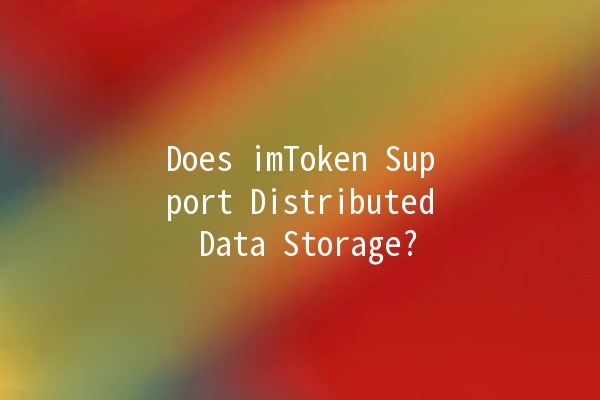imToken is a widely recognized mobile wallet designed for managing digital assets like cryptocurrencies and tokens. As blockchain technology rises in popularity, many users are curious about its features, including safety, accessibility, and the underlying technical framework supporting such functionalities. One of the key areas of interest is whether imToken has incorporated distributed data storage capabilities into its services.
Distributed data storage refers to a network architecture in which data is stored across multiple physical locations, enhancing data redundancy and reducing the risks of data loss. This storage configuration is essential in the blockchain space, where decentralization is key to operational security.

As of now, imToken primarily functions as a digital wallet focused on secure private key management and transaction processing for cryptocurrencies. Its underlying architecture is designed more around securing user assets rather than providing a distributed data storage solution.
Here's how you can evaluate whether imToken might support distributed data storage in the future:
Should imToken decide to integrate distributed data storage, several benefits could follow.
By distributing user data over various nodes across the blockchain network, imToken could significantly reduce risks associated with centralized data storage.
Distributed systems could facilitate faster processing times, enabling quicker validation and confirmation of transactions.
With distributed data, users might gain more control over their assets and identities, empowering them to manage transactions without relying solely on centralized authorities.
Here are five productivity enhancement tips to get the most out of your experience with imToken:
Description: Use imToken to manage various cryptocurrencies across different blockchains at a single interface.
Application: By having multiple chains in one wallet, users can easily switch and transfer assets without needing to log in to different wallets.
Description: Activate transaction notifications in the imToken app.
Application: Ge timely alerts about transaction confirmations or changes in market conditions to stay informed without constantly checking the app.
Description: Utilize decentralized applications (DApps) available through imToken.
Application: Engage with DApps like decentralized exchanges and lending protocols directly from your wallet to maximize your asset's potential.
Description: Implement additional security layers such as 2FA (TwoFactor Authentication).
Application: Ensure your wallet is protected against unauthorized access by regularly updating your security settings and using complex passwords.
Description: Frequently back up your wallet data and private keys.
Application: Use secure cloud storage or physical storage options to keep your backup safe. This is vital to recover access in case of device loss.
imToken currently does not natively incorporate distributed data storage solutions. It mainly focuses on wallet services for cryptocurrencies, ensuring that private keys and transactions are secure. However, users can explore external DApps that may offer integrations for decentralized storage solutions.
imToken employs robust encryption methods to secure user data and private keys. The app's infrastructure is designed to keep user assets secure from malicious attacks, although it is not structured as a distributed data store.
Yes, imToken encourages community feedback. Users can share suggestions and feature requests through their official communication channels, which can potentially lead to future updates.
imToken supports a wide range of cryptocurrencies, including popular assets like Bitcoin (BTC), Ethereum (ETH), and various ERC20 tokens, among others. Users can easily manage these assets within the app.
Users should always ensure they are downloading the official imToken app from recognized platforms. Additionally, it is crucial to be wary of unsolicited links and never share their private keys or recovery phrases with anyone.
Using imToken typically does not incur additional fees for transactions; however, users may need to pay standard network fees based on the blockchain they are using. Always check the transaction fees before proceeding.
As of now, imToken does not support distributed data storage as part of its core services. However, it offers robust features centered around securing cryptocurrencies and enhancing user experiences. By keeping an eye on updates and trends within the blockchain community, users can stay informed about any changes to imToken's service offerings.
For now, employing productivity tips and best practices can further enhance your experience with the wallet. As technology evolves, the need for distributed data solutions may become more pressing; thus, it will be interesting to see how services like imToken adapt to these changes.